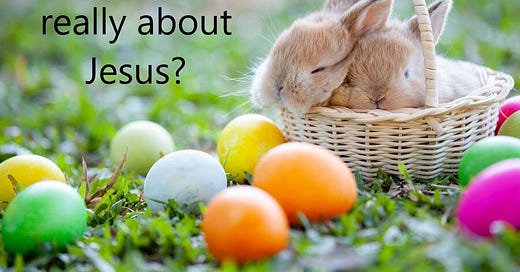Is Easter Really About Jesus?
Easter is confusing to me.
It seems if you ask most people they will say that Easter is about Jesus, yet the celebrations seem to be more of a cultural appropriation of the pre-Christian era stemming from the celebration Eostre a west Germanic goddess who represented dawn, spring and new beginnings. The celebration of spring is present in many ancient customs, across all cultures, and focussed on Eostre/ Ostara who symbolizes fertility, rebirth, and renewal and whose beginnings can be traced back to Ishtar -Astarte the Babylonian goddess of fertility and sex.
At least three Germanic Academic texts categorically state that Eostre/Ostara were originally the Goddess Ishtar-Astarte. Rigid academic investigation into the subject shows that Ishtar-Astarte’s worship was prevalent not only in the “Middle East” but down the Levantine Corridor, into Egypt and across Northern Africa, through ancient Greece and Rome, across Europe, up to Iberia, and even into the British Isles where she had at least SEVEN altars dedicated to her.
Regardless of her beginnings Eostre is where most of the Easter traditions come from, including the name itself, the traditional colors of Easter green, yellow and purple and the symbols of the rabbit and eggs both of which represent fertility and new life.
But what do these have to do with Jesus? Absolutely nothing. However, after Constantine decided to Christianize the Empire, Easter was deemed to represent the resurrection of Jesus. Easter had been quite distinct from the memorial of the crucifixion, the resurrection and ascension of Jesus but was introduced into the apostate Western religion, as part of the attempt to adapt ancient festivals to Christianity.
The Encyclopaedia Britannica says about this transition: "There is no indication of the observance of the Easter festival in the New Testament, or in the writings of the apostolic Fathers. The first Christians continued to observe the Jewish festivals, though in a new spirit, as commemorations of events which those festivals foreshadowed. The Gentile Christians, on the other hand, unfettered by Jewish traditions, identified the first day of the week [Sunday] with the Resurrection, and kept the preceding Friday as the commemoration of the crucifixion, irrespective of the day of the month" (11th edition, p. 828, "Easter").
The one thing we know that is true is that Jesus was crucified on Nisan 14 between high noon and sunset (his crucifixion was recorded as being the day of preparation – meaning the day before the Sabbath (the Sabbath is from sundown on Friday to sundown on Saturday).* We also know that he was crucified in the year 33 AD since that is when Nisan 14 was on a Friday. We then know that he was resurrected three days after his death and for many years that was acknowledge as the Monday Nisan 17. So why do we celebrate Easter Sunday? It doesn’t add up. Even for those who follow the bible. Jesus said, “ For as Jonah was three days and three nights in the belly of a huge fish, so the Son of Man will be three days and three nights in the heart of the earth.” Not one, not two but three. If Jesus was crucified on Friday, that would make Monday the day, not Sunday. So again I wonder how has “Easter Sunday” become the day people set aside as the day that is most important to remember Jesus? Do they count Friday ( even though it is only at best 6 hours of the day) as day one? A full day in those times was from sunset to sunset. That is why the Sabbath is from Friday at sunset to Saturday at sunset. Therefore shouldn’t the first night and day be from Friday to Saturday, the second from Saturday to Sunday and the third be from Sunday to Monday?
Perhaps the truth and accuracy of the historical event was less of a concern than creating a day that would suit society and bring those who were not Christian into the fold.
In the end what is Easter really about for you? Do you stop and think about Jesus on Nisan 14 ( which is not usually the same day as “Good Friday”) or do you celebrate on Easter Sunday with any thought to Jesus’s life and focus on chocolate bunnies, making Easter egg hunts and getting together for a fancy dinner and drink with family?
*In the year of Jesus’s crucifixion the High Sabbath and the weekly sabbath fell on the same day.



